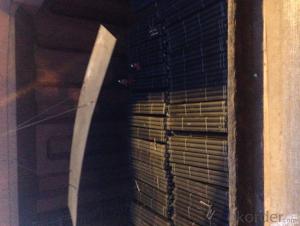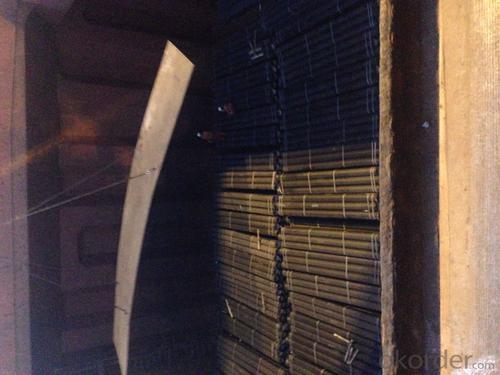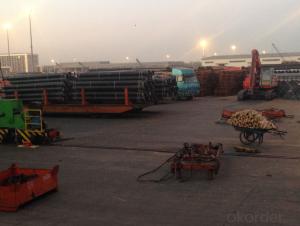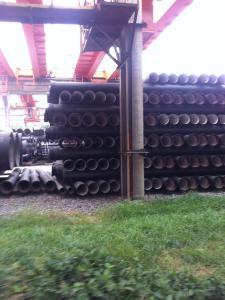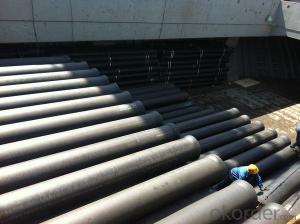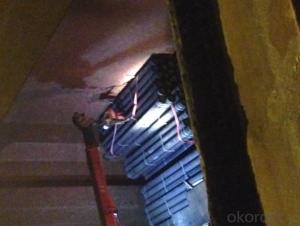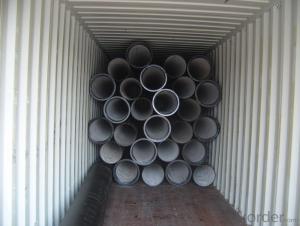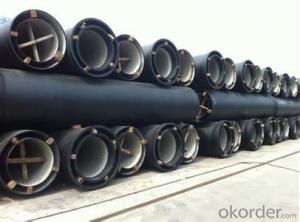DUCTILE IRON PIPES & PIPE FITTINGS DN100
- Loading Port:
- Tianjin
- Payment Terms:
- TT OR LC
- Min Order Qty:
- 25 m.t
- Supply Capability:
- 30000 m.t/month
OKorder Service Pledge
OKorder Financial Service
You Might Also Like
Material : Ductile Cast Iron
Size Range : DN 80mm to DN 2000mm
Unit Effective Length : 6m or 5.7m
Manufacture Standard: ISO 2531:1998/ EN 545:2006/EN 598:2007
Annual capacity : 200,000 tons
Coating Exterior: Zinc 130g/m2 according to ISO 8179-1 and bitumen coating 70 microns.
Cement Interior: Portland Cement/ High Alumina Cement/ Sulphate Resisting Cement Lining according to ISO 4179
Special requirements on external coating and internal lining can be applied
We also provide accessories such as SBR/EPDM rubber gaskets, lubricant paste, pipe caps, PE sleeves, etc.
Additional Parts:
Each pipe is strictly inspected according to related standard to ensure permanently high performance.
Easy Installation at site and service free for life
Long Service Lifespan
Quotation will arrive you within 24hours once we get your inquiry.
We guarantee offering you a competitive price.
A copy of original inspection reports of pipes will be offered after shipment.
Photos of loading process will be sent to the customer after shipment effect.
We will follow-up the delivery progress after shipment effect and update to the customer on weekly basis.
- Q: How does ductile iron pipe perform in areas with high soil settlement?
- Ductile iron pipe is known for its exceptional performance in areas with high soil settlement. Due to its inherent strength and durability, it can withstand the pressures exerted by settling soil without compromising its structural integrity. The flexibility of ductile iron pipe allows it to accommodate ground movements caused by soil settlement, thus minimizing the risk of pipe failure or damage. Its ability to adapt to these movements helps prevent cracks, leaks, and breaks that could occur in more rigid pipe materials. Moreover, ductile iron pipe's strong resistance to corrosion provides an added advantage in high soil settlement areas. It can withstand the corrosive effects of the soil and other environmental factors, ensuring the longevity and reliability of the pipe system. In areas with high soil settlement, ductile iron pipe is often the preferred choice due to its ability to handle ground movements without sacrificing performance. Its strength, flexibility, and resistance to corrosion make it an ideal solution for maintaining a robust and efficient water distribution system even in challenging soil conditions.
- Q: Can ductile iron pipe be used for sewer and wastewater systems?
- Yes, ductile iron pipe can be used for sewer and wastewater systems. Ductile iron is a type of cast iron that has improved properties such as increased durability, strength, and flexibility. These qualities make it suitable for underground applications, including sewer and wastewater systems. Ductile iron pipes are resistant to corrosion and can withstand high-pressure conditions, making them ideal for conveying sewage and wastewater. Additionally, ductile iron pipes have a long service life and require minimal maintenance, which makes them a cost-effective choice for sewer and wastewater infrastructure.
- Q: Are ductile iron pipes suitable for bridge crossings or crossings under roadways?
- Bridge crossings or crossings under roadways can be easily accommodated with ductile iron pipes. These pipes possess remarkable strength, durability, and resistance against external forces like heavy traffic loads and bridge movements. With their high tensile strength, they can endure the stress and strain caused by vehicles passing over them. Furthermore, ductile iron pipes exhibit exceptional corrosion resistance, rendering them suitable for underground installations that may come into contact with water or other corrosive elements. Additionally, their long lifespan and minimal maintenance requirements make them a dependable choice for bridge crossings or crossings under roadways. Consequently, ductile iron pipes offer a cost-effective and efficient solution for such infrastructure projects.
- Q: How does ductile iron pipe handle temperature changes?
- Ductile iron pipe is designed to handle temperature changes effectively. Its composition and structure make it highly resistant to thermal expansion and contraction, minimizing the risk of damage. This property allows the pipe to withstand extreme temperature variations without compromising its structural integrity, making it a reliable choice for various applications where temperature fluctuations are common.
- Q: Can ductile iron pipes be used for irrigation of sports fields?
- Yes, ductile iron pipes can be used for irrigation of sports fields. Ductile iron pipes are known for their strength, durability, and flexibility, making them an ideal choice for various applications, including irrigation. These pipes have high resistance to external pressures and impact, which is beneficial for sports fields that may experience heavy foot traffic and potential damage. Additionally, ductile iron pipes have excellent corrosion resistance, ensuring long-term performance and minimal maintenance. Their smooth interior surface also allows for efficient water flow, preventing clogs and ensuring adequate irrigation for the sports fields. Overall, ductile iron pipes are a reliable and suitable option for irrigation systems in sports fields.
- Q: How does ductile iron pipe perform in areas with high soil erosion?
- Ductile iron pipe performs well in areas with high soil erosion due to its inherent strength and durability. Its thick walls and strong composition make it resistant to external pressures, including the erosive forces of soil. The pipe's ability to withstand the effects of soil erosion helps ensure its long-term performance and reliability in such challenging environments.
- Q: How do ductile iron pipes handle ground settlement near construction foundations?
- Ductile iron pipes are known for their strength and durability, making them highly resistant to ground settlement near construction foundations. Due to their flexible nature, these pipes can withstand minor ground movements without experiencing significant damage or failure. The inherent flexibility of ductile iron pipes allows them to adapt and adjust to ground settlement, ensuring the integrity of the pipeline system even in challenging conditions.
- Q: What is the difference between flexible joint mechanism and seismic cast iron pipe DN100 and ductile iron pipe?
- Nodular cast iron has high strength and strong plasticity. The tensile strength of ductile iron is twice that of gray iron, and the yield strength even exceeds that of cast steel.
- Q: Usage of ductile iron pipe expander
- Ductile iron expansion is mainly provided with large flexible, easy installation, the product main material for nodular cast iron, nodular cast iron is mainly through spheroidization and inoculation by spherical graphite, effectively improve the mechanical properties of cast iron, especially the plasticity and toughness increased, resulting in higher than the strength of carbon steel. The material mainly has high strength of plasticity and toughness, and its development at home and abroad is very fast, the output has exceeded cast steel and malleable cast iron, become second only to gray cast iron casting alloy material. Spheroidal graphite is obtained by spheroidizing and inoculation of nodular cast iron. It can effectively improve the mechanical properties of cast iron, especially improve the plasticity and toughness, so as to obtain higher strength than carbon steel.
- Q: Can ductile iron pipes be used for underground cooling water systems?
- Yes, ductile iron pipes can be used for underground cooling water systems. Ductile iron is known for its strength, durability, and corrosion resistance, making it suitable for various applications, including underground installations. It can withstand the pressure and temperature requirements of cooling water systems, providing a reliable and long-lasting solution.
Send your message to us
DUCTILE IRON PIPES & PIPE FITTINGS DN100
- Loading Port:
- Tianjin
- Payment Terms:
- TT OR LC
- Min Order Qty:
- 25 m.t
- Supply Capability:
- 30000 m.t/month
OKorder Service Pledge
OKorder Financial Service
Similar products
Hot products
Hot Searches
Related keywords
